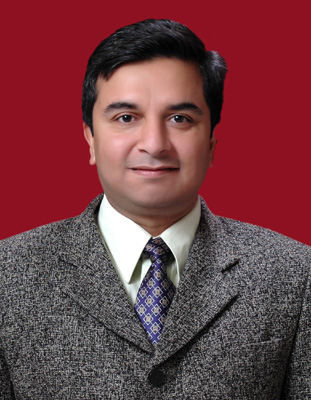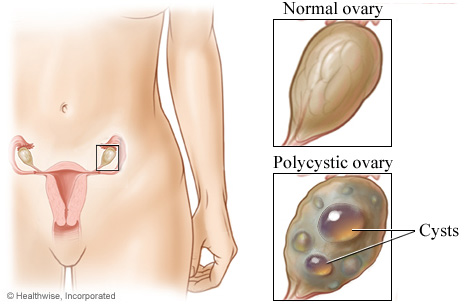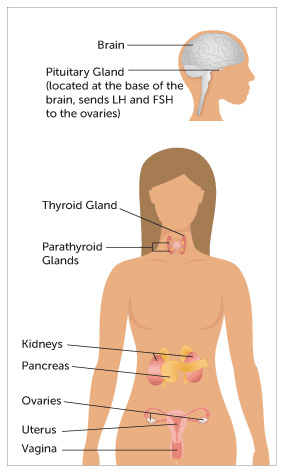 An Overview
An Overview
Polycystic Ovarian Syndrome (PCOS) is a problem in which a woman’s hormones are out of balance. It can cause problems with your periods. PCOS also may cause unwanted changes in the way you look. If it isn’t treated, over time it can lead to serious health problems, such as diabetes and heart disease. Most women with PCOS grow many small cysts on their ovaries. That is why it is called polycystic ovary syndrome. The cysts are not harmful but lead to hormone imbalances.
Early diagnosis and treatment can help control the symptoms and prevent long-term problems. Hormones are chemical messengers that trigger many different processes, including growth and energy production. Often, the job of one hormone is to signal the release of another hormone.
In PCOS the hormones get out of balance. One hormone change triggers another, which changes another.
The sex hormones get out of balance. Normally, the ovaries make a tiny amount of male sex hormones (androgens). In PCOS, they start making slightly more androgens. This may cause you to stop ovulating, get acne, and grow extra facial and body hair.
The body may have a problem using insulin, called insulin resistance. When the body doesn’t use insulin well, blood sugar levels go up. Over time, this increases your chance of getting diabetes.
The cause of PCOS is not fully understood, but genetics may be a factor. PCOS seems to run in families, so your chance of having it is higher if other women in your family have it. PCOS can be passed down from either your mother’s or father’s side.
Symptoms
Symptoms of PCOS tend to be mild at first. You may have only a few symptoms or a lot of them. The most common symptoms are:
- Acne.
- Weight gain and trouble losing weight.
- Extra hair on the face and body. Often women get thicker and darker facial hair and more hair on the chest, belly, and back.
- Thinning hair on the scalp.
- Irregular periods. Often women with PCOS have fewer than nine periods a year. Some women have no periods. Others have very heavy bleeding.
- Fertility problems. Many women who have PCOS have trouble getting pregnant (infertility).
- Depression.
- Try to fit in moderate activity and/or vigorous activity often. Walking is a great exercise that most people can do.
- Eat heart-healthy foods. This includes lots of vegetables, fruits, nuts, beans, and whole grains. It limits foods that are high in saturated fat, such as meats, cheeses, and fried foods.
- Most women who have PCOS can benefit from losing weight. Even losing 10 lb (4.5 kg) may help get your hormones in balance and regulate your menstrual cycle.
- If you smoke, consider quitting. Women who smoke have higher androgen levels that may contribute to PCOS symptoms.
PCOS is a complex and heterogeneous disease. In spite of accumulated literature and remarkable advances in the understanding of polycystic ovary syndrome, the etiology of the PCOS is not clear and the primary mechanism is not known. Broadly, treatment depends on the symptoms expressed and whether the therapy is for aesthetic reasons in patient not desiring pregnancy, for infertility or even to prevent long-term complication.
The concept of wide spectrum of signs (Adam Balen), ranging from single finding of polycystic ovarian morphology (detected by USG). To obesity, menstrual irregularities, infertility, cardiovascular diseases – all are due to metabolic disturbances involving increased level of LH, insulin and androgen and dyslipidemia.
Diagnosis
- Medical history: A history of headaches or blurred vision (indicating pituitary tumor), any signs or symptoms of thyroid dysfunction (as a differential diagnosis of amenorrhea), or clinical signs of diabetes (indicating adrenal tumor) need to be elicited. History of acne, hirsutism, deepening of the voice, and increase in muscle mass (without exercise). A rapid onset of these symptoms is rare in a PCOS patient, but if present, they suggest a need for an urgent work-up, as an ovarian tumor or adrenal tumor needs to be ruled out. Also masculinization is uncommon with PCOS patients and is more suggestive of congenital adrenal hyperplasia.
- Family history: PCOS tends to run in families; it is important to ask about family history. Some believe that if a mother has PCOS and her daughter is showing signs of it, she should be evaluated by her paediatrician or by an endocrinologist.
- Social/cultural history: Ethnic factors must be considered in the evaluation of women who are hirsute. Northern European white women and women of Asia usually have small amount of hair on their face, torso, and extremities. However, Mediterranean white women will frequently have hair on their upper lip, chin, and have dark hair on their arms and legs. Also, certain conditions like pregnancy and menopause can cause transient hirsutism. An important caveat to remember is the patient may not appear hirsute at the time of the examination as she may be using cosmetic procedures like waxing, shaving, or electrolysis to control it.
- Menstrual history: In addition to obtaining a thorough medical and surgical history, elicit a completed menstrual history, including menarche and family history PCOS. A history of history of hirsutism, acne, alopecia, menstrual irregularities, as this will usually date back to menarche. Inquire about recent pregnancy status and other reproductive history such as miscarriages.
- Drug history: In addition to asking about the patient’s current medications it is important to remember that there are certain medications and classes of medications that can cause transient hirsutism. Examples of these are phenytoin (Dilantin), diazoxide , glucocorticoids, and the phenothiazines.
Management and Treatment including Future Perspective
PCOS is caused by an imbalance in the hormones (chemical messengers) in your brain and your ovaries. PCOS usually happens when a hormone called LH (from the pituitary gland) or levels of insulin (from the pancreas) are too high, which results in extra testosterone production by the ovary.

Just a review of the reproductive anatomy of your body. This includes all the major glands which are secreting various hormones responsible for menstruation and other important functions.
- The pituitary gland in your brain makes the hormones luteinizing hormone (LH) and follicle stimulating hormone (FSH).
- After getting the signal from the hormones LH and FSH, the ovaries make estrogen and progesterone the female sex hormones.
- All normal ovaries also make a little bit of the androgen testosterone, a male sex hormone. The pancreas is an organ that makes insulin. High levels of insulin can also cause the ovaries to make more of the hormone testosterone.
Having PCOS means that your ovaries aren’t getting the right hormonal signals from your pituitary gland. Without these signals, you won’t ovulate (make eggs) every month. Your period may be irregular, or you may not have a period at all.
Normal Menstruation
- The menstrual cycle starts when the brain sends LH and FSH to the ovaries. A big surge of LH is the signal that causes the ovaries to ovulate, or release an egg.
- The egg travels down the fallopian tube and into the uterus. Progesterone from the ovary causes the lining of the uterus to thicken.
- If the egg isn’t fertilized, the lining of the uterus is shed. This is a menstrual period.
- After the menstrual period, the cycle begins all over again.
Regular Menstrual Cycle vs. PCOS Menstrual Cycle
The diagram on the left shows a regular menstrual cycle, and the diagram on the right shows a PCOS cycle with no ovulation.
- With PCOS, LH levels are often high when the menstrual cycle starts. The levels of LH are also higher than FSH levels.
- Because the LH levels are already quite high, there is no LH surge. Without this LH surge, ovulation does not occur, and periods are irregular.
Girls with PCOS may ovulate occasionally or not at all, so periods may be too close together, or more commonly too far apart. Some girls may not get a period at all.
While there is no cure for polycystic ovary syndrome (PCOS), there are many ways to manage symptoms using both lifestyle changes and medication, if necessary. It is important to talk to your doctor if you think you have PCOS symptoms as early treatment can help reduce your risk for long-term complications.
MANAGEMENT STRATEGY — The choice of therapy for PCOS depends on the individual adolescent’s symptoms and her goals and preferences. First-line treatment is ordinarily combination oral contraceptive pills (OCPs), since these correct both menstrual abnormalities and hyperandrogenemia. If hirsutism is not controlled satisfactorily by cosmetic and OCP treatment, physical hair reduction methods and antiandrogen therapy are then added. Lifestyle modification is first-line treatment for overweight and obesity. Metformin is suggested if the abnormal glucose tolerance or lipid abnormalities of the metabolic syndrome cannot be normalized by weight loss.
Lifestyle Changes
- If you are overweight, losing even 5-10 percent of your current body weight can help regulate your periods, improve cholesterol levels, and may improve excess hair growth.
- Regular exercise can help you lose weight as well as reduce your risk for diabetes and heart disease. Thirty minutes of moderate to vigorous exercise each day has been shown to reduce the risk for development of diabetes and the metabolic syndrome (a group of risk factors that increase your risk for heart disease and diabetes)
- Eating a low-calorie diet with limited processed foods is helpful for weight loss. Processed foods include:
- Cakes, cookies, and other baked goods
- Canned or frozen foods high in sodium
- Chips
- Fast food
- Fried foods
- Hot dogs, chicken nuggets, and deli meats
- Pasta, bread, crackers and other foods made from white flour instead of whole grain
- Soda
- Sugary cereals
- White rice (brown or wild rice is better)
Weight Management Tips
- Choose nutritious, high-fiber carbohydrates instead of sugary or refined carbohydrates
- Balance carbohydrates with protein and healthy fats
- Eat small meals and snacks throughout the day instead of large meals
- Exercise regularly to help manage insulin levels and your weight
Talking to a registered dietitian may help you make better food choices that may help with weight loss.
Medications
- Birth control pills: An oral contraceptive pill containing both estrogen and progestin can help control symptoms long term. The pill decreases testosterone levels in your body, which reduces excessive hair growth and acne, helps get your period on a more regular cycle, and may reduce your risk for endometrial cancer (cancer of the lining of the uterus). Below given are the mechanism by which these pills will work in your body:
- Correct the hormone imbalance
- Lower the level of testosterone (which will improve acne and lessen hair growth)
- Regulate your menstrual periods
- Lower the risk of endometrial cancer (which is slightly higher in young women who don’t ovulate regularly)
- Diabetes medication: Female teens and women with PCOS who have type 2 diabetes or pre-diabetes, and do not respond to diet changes and exercise may benefit from taking the diabetes medication metformin. This drug also may help regulate your period if you have PCOS and cannot take birth control pills. Metformin is not approved by the U.S. Food and Drug Administration for these purposes.
- Agents to reduce hair growth: Medications that block the effects of testosterone on the skin may help reduce excess hair growth. A cream containing the medication eflornithine also is available to slow hair growth on the face. In addition, you can remove excess hair growth with wax, shaving, electrolysis, or laser treatment.
- Acne: There are various ways to treat acne, including the birth control pill, topical creams, oral antibiotics, and other medications.
If you’ve been told you have PCOS, you may feel frustrated or sad. You may also feel relieved that at last there is a reason and treatment for the problems you have been having, especially if you have had a hard time keeping a normal weight, or you have excess body hair, acne, or irregular periods. Having a diagnosis without an easy cure can be difficult. However, it’s important for girls with PCOS to know they are not alone. Finding a health care provider or Doctor who knows a lot about PCOS and is someone you feel comfortable talking to is very important. Keeping a positive attitude and working on a healthy lifestyle even when results seem to take a long time is very important, too.It’s important to follow-up regularly with your Doctor and make sure you take all the medications prescribed to regulate your periods and lessen your chance of getting diabetes or other health problems. Because you have a slightly higher chance of developing diabetes, your health care provider may suggest that you have your blood sugar tested once a year, or have a glucose challenge test every few years.
- Blood sugar test once a year
- HbA1C test (a test that tells how high your blood sugar has been the past 2-3 months) once a year
- Glucose tolerance test every few years
Note
Consult with your doctor to see what treatments are right for you. Choose a doctor who specializes in women’s health (a Gynecologist or primary care physician). This a word of caution that no drug mentioned above in the article has to be taken on your own. Always consult your doctor for the authorised prescription. Author bears no responsibility for the same. This work is for your basic knowledge and not to be used as a prescription.
(Dr Alok Sharma is MD [Obstetrics and Gynaecology], MICOG, DHA. Registrar, Kamla Nehru State Hospital for Mother and Child, IGMC, Shimla. Email: [email protected])





